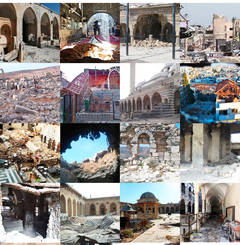Declaration by Irina Bokova, UNESCO Director-General, on the occasion of the 60th anniversary of the 1954 Hague Convention for the Protection of Cultural Property in the Event of Armed Conflict and its 1954 (First) Protocol, and the fifteenth anniversary of the 1999 Second Protocol to this Convention.
Over the past years, cultural heritage has been under attack in many conflicts, such as in Libya and Mali as well as in Syria, where we have reached a point of no return in the destruction of the cultural heritage. World Heritage sites have suffered considerable damage and many of them are used for military purposes. The destruction of cultural heritage affects people over the long term, attacking a collective sense of identity, as well as trust and social cohesion, weakening efforts for reconciliation and peace.
Damage to any cultural property is damage to the cultural heritage of all humanity. This causes irreversible loss to people living in conflict situations, as well as to people across the world. UNESCO is determined to make every effort to prevent this from happening. Our main tool is the 1954 Hague Convention for the Protection of Cultural Property in the Event of Armed Conflict, for which UNESCO is depositary. This is the only international agreement that focuses exclusively on the protection of cultural heritage during hostilities. It aims to prevent the destruction, misuse or theft of cultural property. Cultural property is also protected by international customary law. On the 60th anniversary of the adoption of the Convention, we must recall its principles and mobilise ever more for its implementation.
126 States are party to the Hague Convention and 103 of them are bound by its First Protocol, adopted 60 years ago. 67 States party to the Convention are party to the Second Protocol adopted 15 years ago. The Second Protocol provides for greater protection and specifies the sanctions to be imposed for serious violations. An Intergovernmental Committee has been tasked to oversee the implementation of the Second Protocol. Since then, the International Criminal Court and the UN Security Council have taken new measures that raise awareness and must now turn to action.
The protection of cultural heritage, both tangible and intangible, is inseparable from the protection of human life and should be an integral part of humanitarian responses and peace-building. Current conflicts underline also the importance of preventive measures, capacity building and awareness during peacetime. These objectives must bring us all together, beyond all differences and borders. Reaching them calls for greater resources and boldness. On this anniversary, I call upon all States to work together to ratify and implement these essential legal instruments. Our cultural heritage is universal -- we must protect it together.

